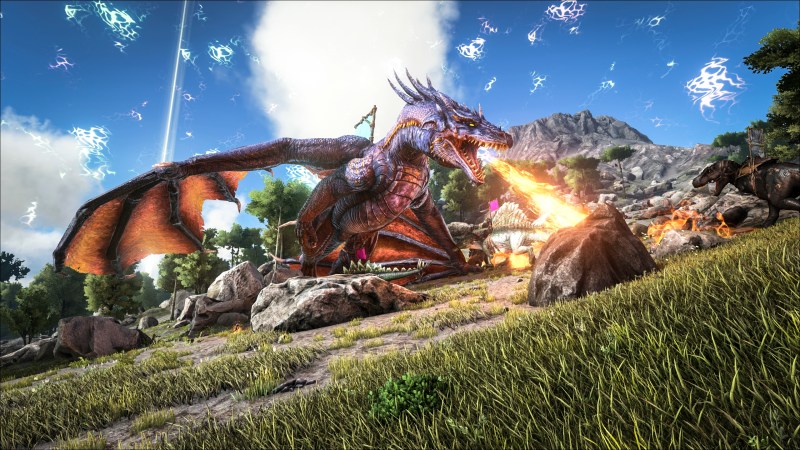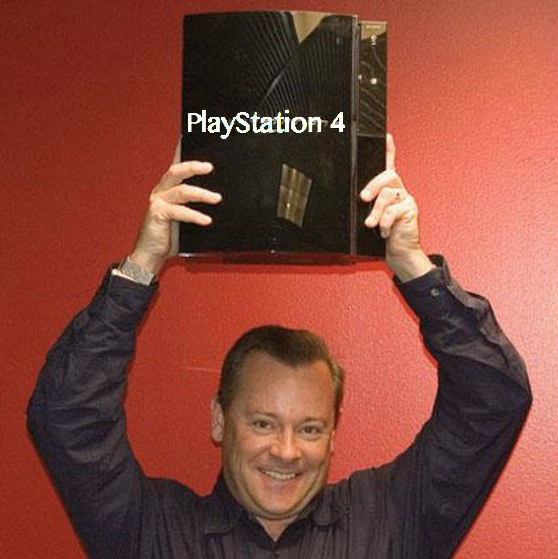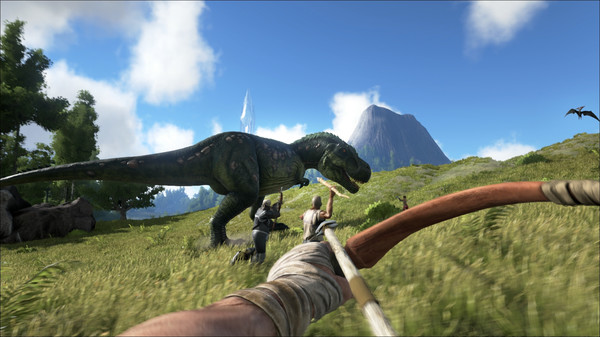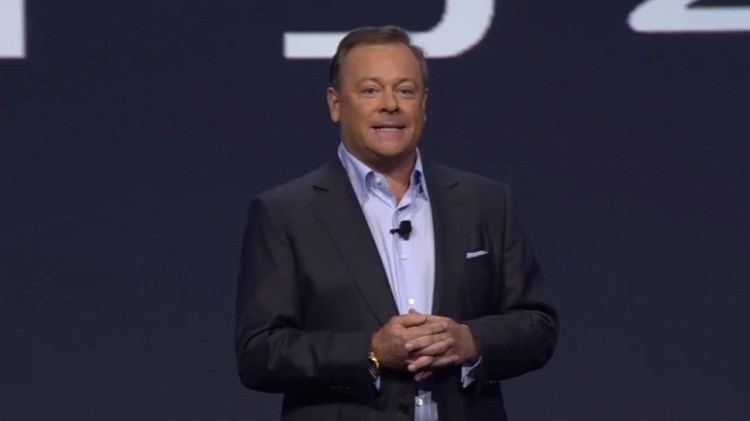
Above: Ark isn’t just about dinosaurs anymore.
The fund we created, Ocean IQ Games, that invested in Blue Isle Studios, has worked out really well. We have a piece of their three games — Slender: The Arrival, Valley, and a game that’s currently out in early access and was our primary investment, Citadel. That fund paid back all the investors within the first year. The first two games that were already on the market generated good revenue, and the third game did extremely well in early access. All the investors recouped their investment. The studio is happy. We’re working hard to bring the final version of Citadel to market late this summer.
Those are probably the two experiences I’ve enjoyed the most. But it’s a very different experience when you go out on your own. The good news is, you have total freedom. The bad news is, you start from zero. You print up your own business cards. You pay all your own expenses. I certainly think I have a good reputation in the industry, but I’m no longer Jack from Sony. I’m just Jack. You have to go out there and farm those relationships and find those strategic partnerships.
I’ve enjoyed it. I wouldn’t go back. I certainly enjoyed the 28 years on the corporate side, but this is definitely what I was meant to do now. I’ve always been passionate about the industry. Everyone wants to make money, but I like contributing to success. I’ve always gotten the greatest amount of satisfaction from happy gamers and from people who create great games, games we remember years down the road. Now that’s predominantly what I spend my time doing.
GamesBeat: How do you look back on Sony? It’s interesting to me that the whole group of people I met in the ‘90s there is gone now. Phil Spencer, Kaz Hirai, Andrew House, you.
Tretton: I went into it with fairly conservative expectations. Or I guess extremely conservative at first. I figured I would put in three years there and, if all went well, it’d be a positive experience. The three-year plan became five years, and then five years became seven. I certainly enjoyed it. I think in any industry and in any company, you get a fairly significant amount of turnover. To be involved in that company for four generations of hardware is something I’m proud of. It exceeded my expectations.
But I certainly got to a point after PlayStation 4—I said, “Okay, what is left for me to do? What more can I accomplish? What more can I personally garner from the company?” I had no intention of moving to Japan. I felt like I’d contributed and gotten as much out of them as I wanted. I felt like it was time to move to something that I had as much if not more passion for. It made sense for me.

Above: Jack Tretton holds a PS4 on the day it was introduced in 2013.
I don’t really know what the rest of the team’s thought process and strategy was, but I thought it was pretty ironic—we had very minimal turnover until I left. Now it’s just short of four years now, and I have trouble finding anybody involved in senior management that I worked with over those 19 years. There’s been a tremendous amount of turnover in the last four years. I’d like to think, if I was first out the door, then I saw the writing on the wall. I don’t think anything negative is going on there. But you just burn out in terms of what you have to contribute and what’s there for you.
I love to just be a supporter of Sony from the outside. The biggest takeaway for me, I had to be all Sony, all the time. Everybody else on the hardware side, for lack of a better word, was the competition. But I’ve really enjoyed working with the Microsoft team in particular for these last four years. I haven’t had much involvement with Nintendo, but now, with Switch being a big success, there’s a great deal of interest at a lot of the developers I’m working with. I really enjoyed Nintendo in the old days. I haven’t worked with them since the mid-‘90s, but I’m anxious to start working with those guys again.
GamesBeat: I had a chance to catch up with Phil last year. I put that same question to him – “What do you think of Sony, Microsoft, and Nintendo now that you’re on the outside? What do you think of the new guys like Google and Amazon?” There’s this accidental games business that the new guys have built. Apple doesn’t care about games directly, but games are huge on their platform. It’s funny that Phil winds up at Google, too.
Tretton: It is. I had an opportunity to have a one-on-one meeting with Jeff Bezos. He reached out to me just after I left Sony. I really enjoyed that. I’ve certainly spoken to Google and Apple as well. They’ve always had the potential to be major players, but I didn’t see the passion at the commitment at the points when I spoke to them, what I feel you really need to have.
There was no question, when I joined Sony, that they were in it to win. They were investing the resources and they had the know-how to be successful. Microsoft was always committed. They had to go through some growing pains because they do things uniquely, but I never questioned their commitment. To be successful in this industry, you have to be committed.
There’s never been any question in my mind that Apple, Amazon, or Google, types of companies like those, could be phenomenally successful if they committed to it. But you know better than anybody that gaming culture is unique. It’s unlike any other business. If they try to run it like other parts of their business, they’re going to struggle. The keys to success at Sony and Microsoft—they’ve kind of been islands off the corporate coast. They’re not running Xbox the way they’d run Windows. That’s a lot of the reason why they’ve been so successful.
It’ll be interesting to see how that culture and that commitment evolves at companies like Google. I did hear about Phil’s appointment. I certainly wish him a lot of luck.
GamesBeat: Do you enjoy playing more of these indie games nowadays, compared to all the triple-A stuff in the past?
Tretton: There were so many games I had to be involved in that I couldn’t physically play them all, even if I had the passion. I felt like, if I wasn’t at least aware and spending time – watching, if not playing – with all the top games—now, because I’m able to pick my partners, I certainly stay on top of the data related to the top-selling games. But again, I gravitate toward the stuff I enjoy playing, and gravitate toward the people I’m working for directly. I really enjoy it.
I’ve never been all about graphics. I’ve always been about immersiveness in gameplay. That’s what I love about the indie games, and what I really love about what Nintendo’s always done, and what they’ve done with Switch. It’s an incredibly entertaining experience. The graphics are secondary in terms of enjoyment.
I think the game industry has gotten to a point where a lot of the risk has had to be stripped out of it. The bigger publishers are doing fewer games and going deeper on their development budgets. You have long-tail revenue streams with downloadable content and map packs and so on. A lot of the top titles you see coming out have a 5 after them, or an 8 or a 2 or a 3. They’re all sequels to franchises that have existed previously on the platforms, or in previous generations.
The great thing about the indie space is there’s this absolutely blank canvas. Most of the developers are gamers first and foremost. They build what they’re passionate about. They’re good at looking at the genres they’ve enjoyed playing and doing these mash-ups. It’s cool that they’re not limited by any corporate oversight. They’re limited by their imaginations. They come up with some cool, creative stuff, and I’m enjoying it.
GamesBeat: If somebody comes to you and says, “Hey, I’ve got a triple-A project,” are you tempted to invest in something like that?
Tretton: I think the key is to stick to the mantra of what your fund was founded on. Ours is trying to stick to that $1-5 million range, stick with somebody who’s had some commercial success. There’s always that temptation to say, “These guys are really impressive, even though they’ve never published a game. Do we want to be their first?” Or if someone’s looking to eat up your entire budget for the year, or two years.
I don’t think you ever say never, but the key for us is going to be to have a workable strategy that we believe in, that’s worked for us in the past, and really stick to that. It would have to be something that really blew us away to make us deviate from our charter and go a little bit afield. That’s not only in terms of scope and budget, but also, there are a lot of service-oriented plays. Somebody’s trying to do something that’s in the space, but it’s not purely a game play. It’s more of a service. I think that was one of the reasons we wanted to a smaller-focus fund, so we could not have our energy diverted into different areas. So I’d say it’s highly unlikely, but you never say never.

Above: Ark: Survival Evolved is also on mobile.
GamesBeat: If there’s a next game you want to create, how would you articulate what you’d like to see happen here, what you’d like to back?
Tretton: Genre-wise, I love open-world survival. In that open world environment, there are just so many different ways you can go. You can pick your own storyline. You can blend different styles together. With user-generated content, it’s amazing to see what happens when you give the gaming audience a blank canvas. It becomes a living organism. That’s really cool. That’s the stuff I gravitate toward the most.
We’re running a fund with financial goals in mind. We do have to believe that a project has commercial viability before we back it. But that’s the thing about the indie space. You can take bets a little bit. If you have a compelling experience, and you keep the costs low, you can find a large enough audience. You can take more risks than you can with a big-budget project. Those guys have to stick to the biggest addressable audience. With smaller budgets, games can take more risks.
I remember franchises like Parappa the Rapper. When you first look at it, you think, “My God, these are stick figures. Why would anybody buy this or like this?” Most of the major software publishers, the independent publishers, would never take a shot at a title like that. But when you’re a platform holder part of the thing is to differentiate the experience. That was always exciting to me, when something that was more of an art project had commercial success. It was breaking down barriers and expanding the different gameplay experiences.
That’s where think indies sit. I don’t think any indie is setting out to do the next Grand Theft Auto. They’re doing their own versions of stuff they’ve played and enjoyed before they got into development themselves. They’ve grown up with gaming. They’ve gotten a great education. There are so many great programs out there now. There are more talented developers out there than there are funds to invest in them and gamers to be exposed to their products.
It’s a perfect time to be in the investment business, because there’s more talent and more great content available than there are funds to spend on it. I think there will be more and people getting involved in the space and creating funds like this. But right now it’s a buyer’s market for us. We feel like we have a first-mover advantage and a strategy that works.

